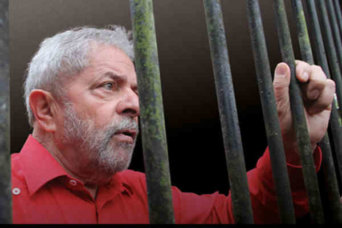- About
- Topics
- Picks
- Audio
- Story
- In-Depth
- Opinion
- News
- Donate
- Signup for our newsletterOur Editors' Best Picks.Send
Read, Debate: Engage.
| topic: | Democracy |
|---|---|
| located: | Brazil |
| editor: | Ellen Nemitz |
Luiz Inácio Lula da Silva, the Brazilian former president who is in jail since April 2018 for being accused of receiving an apartment as part of a kickback from a construction company, can now go to the semi-open regime because he has already fulfilled a sixth of the penalty and has a “good behaviour”. But he does not want to. Why?
The trial is being questioned in the Supreme Court after The Intercept Brazil began to publish, in June 2019, many chats between members of Car Wash Operation – including former judge Sergio Moro (now Justice Minister) and the prosecutor Deltan Dallagnol, indicating a lack of exemption. Some chats make it clear that the proofs were not conclusive and that all members involved tried to convince public opinion of Lula’s guilt.
Even before this huge scandal, which put Car Wash operation in the centre of media attention, Lula pleaded himself innocent. In a letter written on September 30, he says that getting out of jail in this condition, having to overnight in the cell and using a mechanism to control his location (an electronic anklet), is a bargain for his rights. “I do not trade my dignity for my freedom”, he wrote. Lula goes further: “All that Car Wash prosecutors really should do is apologise to the Brazilian people, to millions of unemployed citizens and to my family, for the evil they have done to democracy, to justice and to the country”.
The situation has divided opinions of jurists, lawyers and politicians who debate if Lula has the right to refuse regime progression or not. Attorney Fernando Castelo Branco told BBC Brazil that there have already been similar decisions accepted by Brazilian justice.
Also, there are theories that Car Wash prosecutors have asked the semi-open regime to weaken the political force of Lula and to lessen the chance of a conviction nullification. Castelo Branco asserts that, for Lula, accepting the progression is the same as accepting the whole process.
The former president expects his innocence to be recognised and the conviction to be nulled by the Supreme Court in a request alleging Car Wash’s unreliability – there is no predicted date for resumption of the trial, which is currently suspended.
He has another chance however, which has been deemed to be worse: another process that is being analysed by the Supreme Court may cancel many judgments if ministers understand that there were errors in the order of final allegations of whistle-blowers and defendants in Car Wash’s process – as the operation did not involve only Lula, politicians from other parties and entrepreneurs would also be benefited by this decision and this would not be an irrefutable proof of his innocence, just a legal manoeuvre.
The decision to not get out of prison is still to be formalised – the deadline for the lawyers to reply officially is Friday, October 18. However, for the TV channel France 24, Lula reaffirmed that he is not going to change his mind. “I want to prove that the liars are the ones who have accused me. I do not want a lighter sentence, I want my innocence”, he said.
Meanwhile, he has plans for the future, adding “I want to fight to give back to this country its dignity. To give back to the Brazilian people the right to eat three times a day, the right to work, the right to study”.

